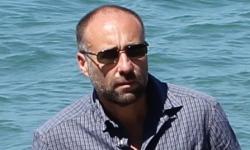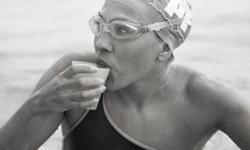09 Feb 2020Tom Watch
Sad news I'm afraid. One of the greatest ever coaches of endurance swimmers, Tom Watch, died today at the age of 93. Tom was from Weymouth and had been ill for some time. He was on the escort boat as coach when CS&PF secretary Kevin Murphy completed his third two-way Channel swim in 1987.
Kevin said: "I owed Tom a huge debt of gratitude for all he did to help me. He is somebody I was proud to have known and his passing is a great loss to the endurance swimming community."
Below is an article written by Channel swimmer/journalist John Goodbody about Tom Watch for the Swimming Times in 2007
For Channel swimmers over the last 60 years, he has been part coach, part adviser, and part father-figure but above, he has always been there, helping, encouraging and guiding them through thousands of training sessions, races and challenges. When marathon swimmers, their faces immersed in the sea, have briefly turned their heads to breathe, it has time and again been the bespectacled, reassuring face of Tom Watch sitting on the accompanying boat that they have glimpsed. This is a comforting sight for anyone involved in the business of surviving the long hours in cold water while attempting to fulfil their ambitions.
Watch has accompanied more than 100 swimmers crossing the straits of Dover, beginning in 1951 with his school friend Godfrey Chapman. Watch was chosen because he was the only person prepared to aid Chapman without being paid. It is this generous policy of informed and enthusiastic amateurism that he has subsequently followed. This summer, Watch is preparing once again to be with the American Peter Jurzynski, who, at the age of 56, is attempting to complete the 21-mile crossing. The accolades for Watch’s work and status range from a letter from Senator Edward Kennedy, praising him for helping Americans, to those of such monuments of long-distance swimming as Kevin Murphy and Mike Read. Murphy, who was accompanied by Watch on several of his most celebrated swims, says:”What you need in marathon swimming is someone who knows how far to push you but is not sympathetic when it hurts. I remember on one occasion wanting to try a Channel crossing in November, which I believe can be done. Although I wanted to start, Tom argued me out of it when we were in Dover. He kept on making objections and talking about the forecast being bad, although I don’t think it was. However, on reflection, he was very probably right to stop me.” Read speaks of Watch being “a coach of enormous reputation, probably as great as anyone in Channel swimming circles. He remains highly respected and still writes schedules for swimmers who contact him.” In 1986, Watch was inducted into the Marathon Swimming Hall of Fame.
Born in the same cottage, on the side of a hill above the quayside in Weymouth, where he still lives, he began swimming himself at the age of 10 by falling into the Harbour and starting to paddle. Together with school-friends, he used to go ’skinny-dipping’ at Newton Cove. It was the only way that the youth of Weymouth could enjoy playing in the water because there was no indoor pool in the town until 1975. Watch has never claimed to be an outstanding swimmer himself and in fact now, at the age of 79, he actually swims as much as he has ever done as an adult, a couple of sessions a week. For much of the time, before he retired at 60, he combined coaching and helping swimmers with his job as a postman, saying:”the Post Office were very generous to me, giving me the time off provided I made it up.”
In 1951, he accompanied Chapman in the Daily Mail-sponsored race across the Channel when a record 18 people on one day completed the swim. Chapman was sixth and the first Englishman. In his book, ‘It’s Cold in the Channel’, the author Sam Rocket, notes how Watch and the other helpers on the rowing boat fed Chapman, stating:”It was a 6 foot aluminium rod with holders for three cups on the end so that he could take his choice of food and drink. Only a menu was missing. The rod was luminous so that Chapman could see it in the dark and near the holders was an electric light bulb for him to choose from the fare in each cup.” Watch says that the experience of being on that swim “gave me the bug.” It is a bug that he has never been able to shake off.
Watch was the observer in 1982 when Jon Eriksson (whose father Ted once held the record for a two-way) became the first person to achieve a triple crossing in 38 hours 27 minutes. “It was flat and calm for three days and when he had done it, I thought no one would ever beat it.” However, five years later, Phil Rush, of New Zealand, did 28 hours 21 minutes. Then there was the epic performance in 1965 of Phil Gollop, 16, when he became the youngest person ever to swim the Straits (a record subsequently broken before an age limit of at least 18 was placed on attempts). Watch recalls:”The swim was largely done in thick fog. There was no radar. We could hear other boats but not see them. It is something that simply would not be allowed nowadays.”
Then there was one of Murphy’s attempts at a three-way, which ended in a force six sou’wester. Watch says:”Half-way back on the second leg, Kevin was violently sick and we ended up near Calais with the wind blowing. However, when Kevin ended he was still looking strong and he would have done it but for the weather.” This was the attempt that Murphy himself remembers as seeing the crew lying flat on the deck because it was so rough.
Another favourite swimmer of Watch was Marc Newman, twice winner of World Cup events, including the inaugural one in Windermere in 1986. “Marc had a lovely stroke and could stand the cold water. He was tremendous.”Then Watch was on board when, the American Chad Hunderby broke the record in 1994 for a single crossing with 7 hours 17 minutes. Watch recalls:”Chad came down here for a training swim and I knew he had a good chance.” One other American for whom he had particular affection was ‘Doc’ Counsilman, coach to 59 Olympians, including Mark Spitz, who won seven gold medals at the 1972 Olympics. In 1979, Counsilman conquered the Channel at the age of 58, then the oldest person to have done it, memorably saying:”it hurt just once -- from beginning to end.” Watch says that Counsilman used to rub his shoulders raw when his shoulders brushed against the side of his face. “I had to nip down to Boots to get him Nuskin to rub on his shoulder.” In one of his books on the sport, Counsilman wrote a personal tribute to Watch’s help.
Watch takes particular satisfaction in helping youngsters, such as Jacqui Hampson, who was 13 years-old in 1982 and Samantha Druce, who completed the crossing the following year when only 12. He says:”Although there was a gale blowing up at the end of the swim, I knew she would do it. She had terrific determination. In training you had to tell her to come out of the water. When she phoned me in February asking me to help her, I asked Samantha when she wanted to do the crossing, she replied:’Next month if you like.’ ! The temperature of the water would then be about 48 degrees Fahrenheit.”
One of the factors that has helped swimmers to be more successful more often in recent years in tackling the crossing has been the warmth of the water, which has risen slightly, particularly early in the season. Another is the improved forecasting so that fruitless attempts are not made so frequently. Diet is more scientific. Watch says:”The days of consuming beef sandwiches and chicken legs have long gone. Now it is regular high-carbohydrate drinks, with perhaps a banana or slice of fruit-cake. The gaps between feeding are now shorter. When Chad Hunderby did his record swim, he was drinking ‘Exceed’, an energy-giving drink, every 15 minutes.” Times are faster, largely because of better training and many outstanding pool swimmers are making a successful conversion.
Watch points out:”However, in Channel swimming, the vital thing is the mind. Natural swimming ability is important but you really must want to do it. Peter Jurzynski, who’ll be coming over this summer, has an untidy stroke but he really wants to do it and gets himself fit.” So how long will he continue helping swimmers ? “When my wife died in 2004, I continued because I knew she would have wanted me to. I might call it a day this year. It depends on how I feel. However, when I see a swimmer get to the shore and fulfil his or her ambition, a lump still comes into the back of my throat. “Spoken like the legend that he is.
In 1991, under the guidance of Tom Watch, John Goodbody, aged 48, became the oldest Briton for 18 years to swim the Channel. He will be covering the 2008 Olympics for The Sunday Times, his 11th successive Summer Games.
Sandettie Lightship Observations
8am, 28th March 2024
Water: 49.3 °F (9.6 °C)
Air: 47.5 °F (8.6 °C)
Wind Speed: 26.0 kn (48.2 km/h)
Wind Direction: SW (220°)
The CS&PF President, Mike Ball and all the committee are deeply saddened by the passing of Ady Brown.… https://t.co/E17pLxZwgw
11 months ago

